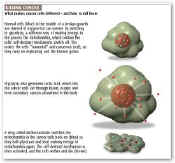|
IN THIS ISSUE
CHEAP DRUG KILLS CANCER
NO
ONE TAKES NOTICE
WHAT
DISCOVERY MEANS FOR PETS
PETCO
VACS 'UNSAFE'
NEWS
ROUNDUP
CALENDAR
AUTHORS'
CORNER
RESOURCES
|
Breeders,
Vets, Dealers,
Shelters,
Owners --
BIG DISCOUNTS ON QUANTITY ORDERS! |
|

|
|
Stop the Shots!
Read John's new book! |
|
 |
|
The book that started it
all - Sparky Fights Back |
|
|
CHEAP
DRUG KILLS MOST CANCERS
 |
|
Unpatentable drug goes
unnoticed by media |
Startling
Report from New Scientist
Recent Findings at University of Alberta Not Likely To Be
Widely Publicized
BY Andy Coghlan
It sounds almost too good to be true: a cheap and simple drug
that kills almost all cancers by switching off their “immortality”.
The drug, dichloroacetate (DCA), has already been used for years
to treat rare metabolic disorders and so is known to be relatively safe.
It also has no patent, meaning it could be manufactured for a
fraction of the cost of newly developed drugs.
Evangelos Michelakis of the University of Alberta in
Edmonton, Canada, and his colleagues tested DCA on human cells
cultured outside the body and found that it killed lung, breast
and brain cancer cells, but not healthy cells. Tumours in rats
deliberately infected with human cancer also shrank drastically
when they were fed DCA-laced water for several weeks. . .
Scientists
Cure Cancer, But No One Takes Notice
From The Student Printz
BY David McRaney
Scientists may have cured cancer last week.
Yep.
So, why haven't the media picked up on it?
Here's the deal. Researchers at the University of Alberta in Edmonton, Canada found a cheap and easy to produce drug that kills almost all cancers. The drug is dichloroacetate, and since it is already used to treat metabolic disorders, we know it should be no problem to use it for other purposes.
Doesn't this sound like the kind of news you see on the front page of every paper?
The drug also has no patent, which means it could be produced for bargain basement prices in comparison to what drug companies research and develop.
Scientists tested DCA on human cells cultured outside the body where it killed lung, breast and brain cancer cells, but left healthy cells alone. Rats plump with tumors shrank when they were fed water supplemented with DCA.
Again, this seems like it should be at the top of the nightly news, right?
Cancer cells don't use the little power stations found in most human cells - the mitochondria. Instead, they use glycolysis, which is less effective and more
wasteful. . .
Mark
Your Calendar
Upcoming Media Events
Wednesday, March 21, 2007
2:30 PM EST
Animal Talk Naturally ['Net conference show on
Animal Talk Radio]
Guest : John Clifton.
Topic: "Are Vaccinations Killing Our Pets?"
Link: to listen:
Wednesday, April 4, 2007
6:00 PM EST
The Donna Seebo Show [Internet Radio on BBS Radio]
Guest: John Clifton
Topic: "Do Vaccinations Do More Harm Than Good?"
Link to listen:
http://www.bbsradio.com/bbs_talk_radio.php
If
you miss the show, listen to archived recording or download it at
http://www.bbsradio.com/archives/donna_seebo.php
|
|
What
Does New Discovery Mean
For Cancer-Pet Caretakers?
Possibilities Promising
BY John Clifton

Here's a case where animals have a better chance for taking
advantage of a new discovery than humans.

|
|
|
Companion animal trials sought |
|
While dichloroacetate (DCA) has been used for
several years in the treatment of human metabolic disorders, it
must be re-approved for use in treating human cancer. And before
the required approvals, it must first go through a lengthy
process of clinical trials using human subjects. Don't hold your
breath -- there's little profit in an old, unpatentable drug
and, hence, little financial support from the chief financier of
clinical trials -- the pharmaceutical industry. It seems clear
that approval for humans is a long way off.
Animals, on the other hand, are
less restricted in this regard. After all, the initial findings
on DCA came from curing cancers in rats.
It seems to me that veterinary
oncologists could begin using the drug immediately on
"terminal" animals. I am trying to spread the word
about this among veterinary oncologists, and in fact have made
some progress. I hope to succeed in convincing an important
animal research organization to begin animal trials on DCA. So
far I've made good progress, and hope to be able to make an
important announcement in the near future.
Meanwhile, I suggest that owners of
cancer dogs and cats bring this matter up with their
oncologists. The vets could be given access to the work done
with rats at the University of Alberta, and proceed accordingly.
It's striking to me how simply the drug was administered --
simply laced in drinking water.
My guess is that DCA will be found
to have minimal side effects in dogs and cats, though one can't
be sure until the drug is actually tried. But one can't
help thinking: if rats did so well on this stuff, why would dogs
and cats fare all that differently?.
[END]
BY John Clifton
PETCO 'Low Cost' vaccinations (given in association with Luv My Pet clinics
(www.luvmypet.com ) flagrantly violate recommended practices of major veterinary associations, leading immunologists and professionals in the field, according to John Clifton, pet health advocate. Clifton, author of "Stop the Shots! Are Vaccinations Killing Our Pets?" advises all dog and cat owners to avoid PETCO vaccinations and educate themselves on the dangers of over-vaccinating before permanent damage is done to their pets in the name of corporate profit.
"This type of wholesale vaccinating -- giving combination shots for four, five, even six diseases at once -- overloads an animal's immune system, paving the way for cancer, allergies, and a host of other
. . .
News
Roundup
Animal Health in the Media
Owners
killing their pets with kindness
A DORSET vet says increasing numbers of furry patients are
coming in to the practice with weight problems. . .
42nd
Veterinary Medical Symposium Focuses On One World, Health &
Medicine
Using "One World, One Health, One Medicine" as its
theme, the 42nd Annual Veterinary Medical Symposium is scheduled
for March 21-24, at the University's Kellogg Hotel and
Conference Center. . .
Home-cooked
meals for pets popular, but complicated
Despite a cultural reluctance to spend more than 30 minutes
making dinner, a growing number of Americans are happy to invest
plenty of time - and money - cooking up gourmet grub for their
domesticated partners.
Help cancer-dogs in financial need!
CONTRIBUTE TO
THE MAGIC BULLET FUND

Support Animal Cancer Research
ANIMAL CANCER
FOUNDATION
Help fund the study that
will prove that Rabies Shots last much longer than the laws
assume. . .
GIVE
TO THE
RABIES CHALLENGE FUND NOW!
|
|
Authors'
Corner
It's Still Us!
BY John Clifton & Josee Clerens


Well, our newsletter has a new name and a new look,
but we're still the same people! Since last year when John started
research for his new
book, Stop the Shots!, our interests have broadened to
encompass other animal health issues, and we thought our
newsletter should expand to reflect that. So, welcome dog and
cat caretakers and all animal lovers who want the best of
health for their wonderful pets! (And who doesn't?)
<<>>
The news about dichloroacetate (see lead story)
amazed us, both in its incredible promise and in the way the
story is being generally ignored. It seems too good to be true,
and more research has to be done, but, well -- wow.
<<>>
If you missed John on the recent
Internet radio show Paws and Effect with Rachel Resk, you
can still listen to the "podcast" (Mp3) version by
clicking here.
<<>>
Our dog Sparky, 12 years old and in his 7th year of
remission from lymphoma, remains active and lively. He was
recently diagnosed with Cushing's disease, but seems to be doing
well on his medication. Cushing's, as you may know, is caused by
a (usually) benign tumor in the pituitary (Sparky's case) or in
the adrenal glands. The result is high levels of cortisol in the
body, causing various symptoms (excessive drinking and
urination, panting, extended belly, etc.)
The excess of hormones is being treated with
medication that inhibits the adrenals from producing them. It's
a balancing act to get the dosage just right, involving frequent
tests to check on the amount of cortisol being produced and
regulating the medication accordingly. "Sparky fights
back" once again -- he's a trooper!
<<>>
John recently participated in the annual book
signing sponsored by the Dog Writers Association of America in
conjunction with the Westminster dog show at New York's Madison
Square Garden. He met a lot of breeders and handlers who
saw his poster for Stop the Shots! and began discussing
pet vaccinations with him. It was surprising how many don't
vaccinate their dogs (at least after the puppy shots).
|
|
|

|
|
John at the Dog Writers Association of
America annual book signing |
Success in all your battles, till next time!
[END]
|








